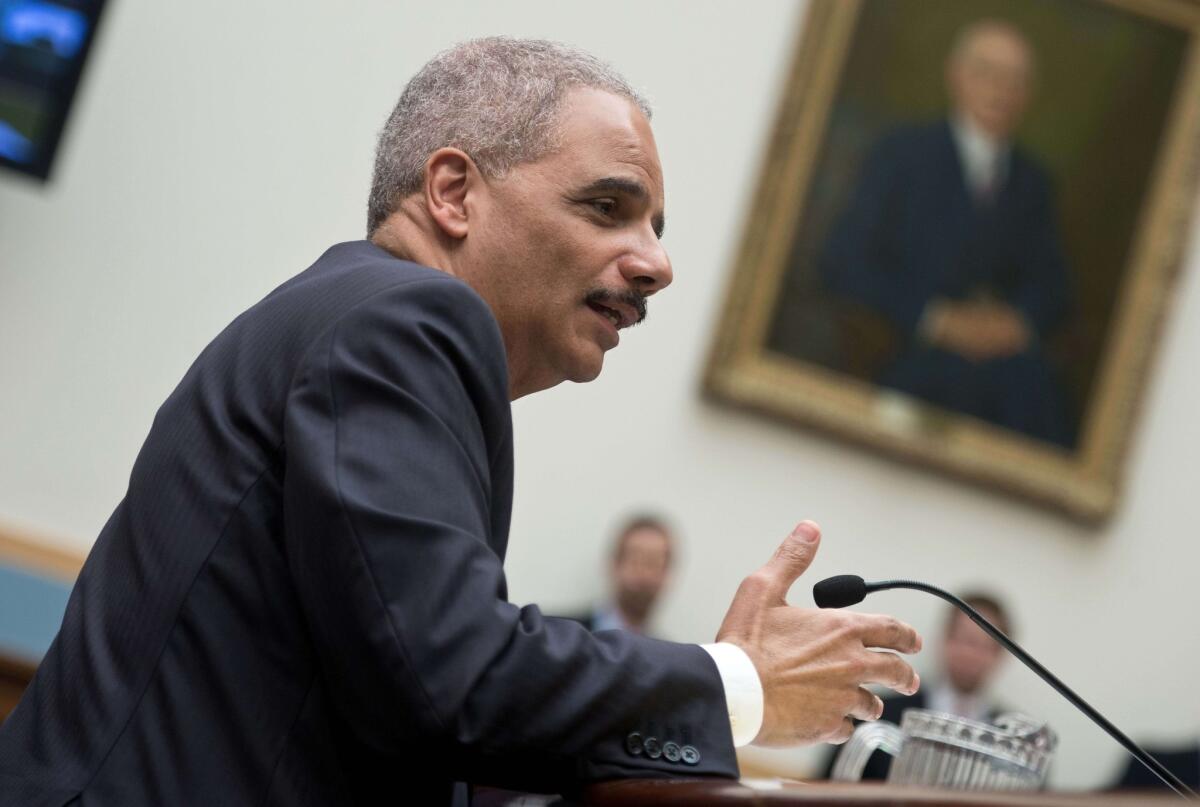Eric Holder: U.S. can target citizens overseas in terror fight

- Share via
Reporting from Chicago — Atty. Gen. Eric H. Holder Jr. defended the U.S. right to target and kill American citizens overseas in the war on terror, telling an audience at the Northwestern University law school that when those individuals pose a real threat to this country and cannot be captured unharmed, “we must take steps to stop them.”
But according to the text of his remarks released by the Justice Department, he stressed that it can only be done “in full accordance with the Constitution,” and asserted that a targeted slaying, like that of American-born Anwar Awlaki in a U.S. drone attack in Yemen last year, can be ordered only after an “imminent threat” was posed to this country and their capture was “not feasible.”
“In this hour of danger, we simply cannot afford to wait until deadly plans are carried out,” Holder said. “And we will not.”
He said the legal right to kill U.S. citizens overseas without benefit of a trial was based in Congress’ authorization to use all necessary and appropriate force against the perpetrators of 9/11 or those who helped them and the president’s power “to protect the nation from any imminent threat of violent attack.”
That authority is “not limited to the battlefields in Afghanistan,” Holder said, adding that, “We are at war with a stateless enemy, prone to shifting operations from country to country.”
His speech, in a carefully orchestrated address Monday at the law school’s Chicago campus, came after sharp questions over the Obama administration’s slaying of Awlaki, born in New Mexico, and how his killing comports with the oft-repeated stance from Holder and the White House that terrorists should be brought to justice in U.S. federal courts in this country.
The attorney general has been at the center of the controversy over trying to defend the administration’s policy toward handling terrorists.
Obama in the 2008 campaign pledged to close the military prison for terrorists at the U.S. Naval Base at Guantanamo Bay, Cuba, and he and Holder have repeatedly insisted that terrorists should be tried in federal civilian courts rather than military tribunals. But after intense pressure from Republicans and some Democrats, they have had to back off on shutting Guantanamo Bay, as well as their plan to try five top Sept. 11 plotters in federal court in New York.
Since the drone attack last fall that killed Awlaki and a second American citizen, Samir Khan, conservatives began casting the administration as two-faced in its policy for terrorists, and liberals questioned how Obama and Holder could justify killing Americans.
Holder did not mention the September slayings of Awlaki or Khan, or the reported slaying of Awlaki’s 16-year-old son, Abdulrahman, in a drone attack two weeks later. Nor did he discuss the Department of Justice Office of Legal Policy document giving the administration legal justification for the use of force. Indeed, he did not even acknowledge that such a document exists, although several organizations have filed suit to make it public.
Holder did not take questions from reporters after his remarks, and while he originally was going to answer questions from the law school audience, on Monday morning he abruptly canceled that plan.
Evidence has shown the 40-year-old Awlaki, a radical cleric, was a major propagandist for al Qaeda in the Arabian Peninsula. He also was linked to Army Maj. Nidal Hasan, who is being court-martialed for the 2009 rampage that killed 13 at Ft. Hood, Texas, and Umar Farouk Abdulmutallab, a Nigerian sentenced in federal court in Detroit last month to life in prison with no parole for trying to ignite a bomb on a jetliner on Christmas Day 2009.
The government has alleged Awlaki encouraged Hasan and Abdulmutallab in their plots to kill Americans, with Holder on Monday strongly suggesting that someone like him meets three criteria for an attack with lethal force – he poses an imminent threat against the U.S, his capture is not feasible, and his slaying “would be conducted in a manner consistent with applicable law of war principles.”
Holder argued that the Supreme Court has applied a “balancing approach” to the 5th Amendment’s Due Process Clause, which guarantees a citizen his right to due process of law that also “takes into account the realities of combat.”
“Here,” he said, “the interests of both sides of the scale are extraordinarily weighty.”
But, the attorney general added, “it is imperative for the government to counter threats posed by senior operational leaders of al Qaeda, and to protect the innocent people whose lives could be lost in their attacks.”
Serrano reported from Washington.
Richard.serrano@latimes.com
dgrimm@tribune.com
More to Read
Sign up for Essential California
The most important California stories and recommendations in your inbox every morning.
You may occasionally receive promotional content from the Los Angeles Times.











